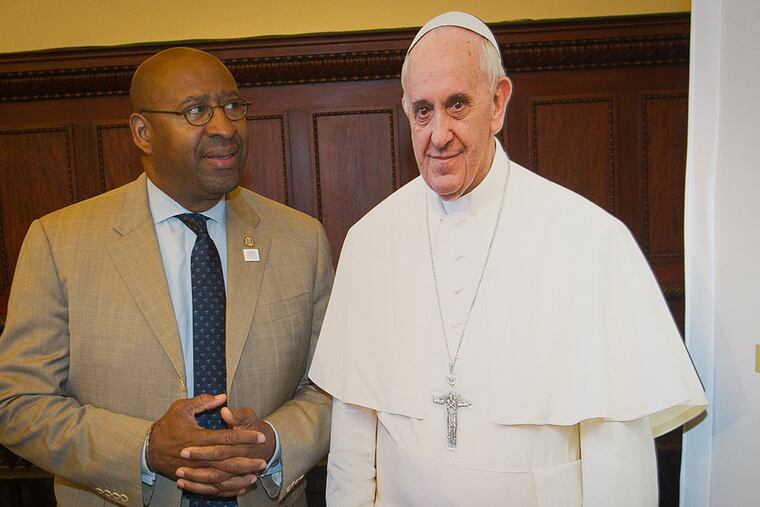Papal visit an investment for Phila., businesses
As the City of Brotherly Love prepares to open its doors to more than 1.8 million visitors expected to come to see Pope Francis in September, many will ask if Philadelphians are ready.

As the City of Brotherly Love prepares to open its doors to more than 1.8 million visitors expected to come to see Pope Francis in September, many will ask if Philadelphians are ready.
After all, it's not every day that a city preps for the rock star of the Vatican to walk the Schuylkill Expressway, passing 30th Street Station, a train station most of us will not be able to use during his visit.
In terms of logistics, Philadelphia is preparing to block highways, limit transportation, and increase security. These are expenses for which the city may not be compensated. In terms of the business community, many restaurants, hotels, and others are bracing for an event that will not produce revenue.
Why?
There are three main areas of Philadelphia that will be most affected by the papal visit: infrastructure, public safety, and commerce and retail.
Philadelphia has a good system of highways, rails, and airports when these systems are not overrun. The city plans to close major highways, add more railcars, limit the number of rail riders, and encourage Catholics and people of other religious denominations to travel by bus to the events. More than 5,000 buses are expected to carry about 250,000 people to the area. One thousand of those buses are expected to be parked in the Camden waterfront area.
However, for all the excitement and anticipation of the pope's visit, all those extra people may not mean more customers for the retail and food establishments that rely on fall weekend sales to tourists or loyal customers. If most people are on this journey to see the pope by rail or bus, there will be limits to what they can do outside the confines of their departing and arriving schedules.
While there will be a captive audience of people attending papal events in the city, most are traveling by SEPTA, chartered buses, or church congregation buses and vans. Some will be parking along the Parkway, others on the Camden waterfront. They will be attending papal events but not necessarily spending money at the Center City Macy's, Stephen Starr's restaurants, or Dave & Buster's.
Since SEPTA is a transportation authority and nonprofit, it has asked all personnel to be ready and available that weekend. And there isn't a profit motive for the agency to ask for state or federal funding in its next budget cycle to assist with these additional expenses. Interestingly, one big winner may be Uber, unless the city tries to stifle and regulate the service.
As for security, city, state, and federal agencies will all be involved. The costs will rival the 2009 inauguration of President Obama, when more than 1.8 million people were in Washington to witness the historic event. Besides Philadelphia police and fire personnel, city employees from other agencies will be active throughout the weekend. Pennsylvania State Police and numerous federal agencies, including the FBI, Homeland Security, and more, will be involved as well.
This will be a large expense for all levels of government, with the city bearing the largest portion. Some local municipalities have already considered declaring their jurisdictions disaster areas so they can file for state and federal funds for reimbursement. That may seem odd, but it's not a bad idea for the smaller towns that will be spending unbudgeted funds on police, fire, emergency medical, and other services at the SEPTA train stops and parking lots in suburban areas.
Opportunities like this happen once in a generation. But don't confuse it with money-generating events for the city and surrounding suburbs, like the Democratic National Convention coming in 2016, Wawa's Welcome America Fourth of July concert, or Jay Z's Made in America Labor Day weekend concert. When hundreds of thousands of people, whether from outside the area or not, converge on Philadelphia on that Saturday and Sunday for papal events on the Parkway, they simply will not be exploring and enjoying the commerce of the city.
No doubt Philadelphia will be allocating considerable resources for Pope Francis' visit, in public safety, public works, and public health. But the city will more than recoup those expenses by showcasing its storied tourism, history, and culture with the intention of bringing even more visitors to Philadelphia in 2016 and beyond.